#the heroes journey review
Explore tagged Tumblr posts
Text
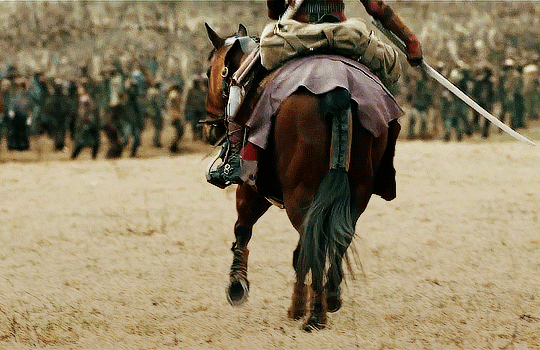





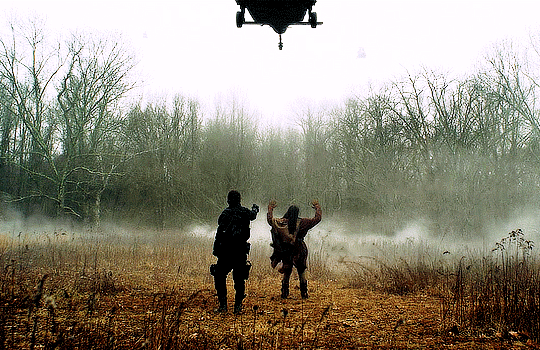
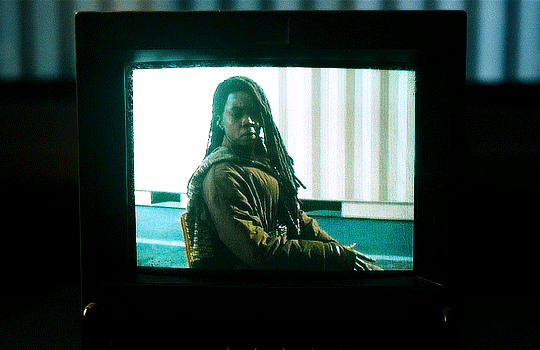
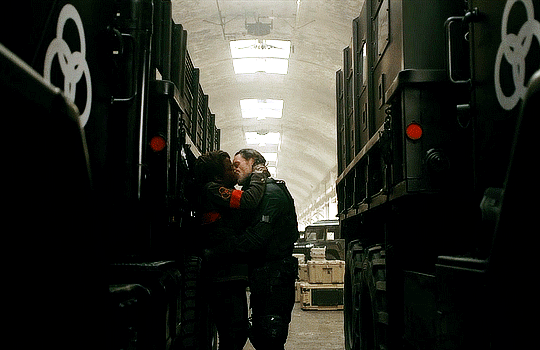

I felt him. I still feel him. THE WALKING DEAD: THE ONES WHO LIVE | S1E2: Gone
#twdedit#towledit#the walking dead#the ones who live#twd: the ones who live#richonne#tvedit#towl spoilers#the budget is budgeting#love how big and atmospheric this ep was#a lot of reviewers mentioned it had a western feel#loved michonne getting the hero's journey#the companions the trials and eventually her damsel#**#*gifs#**tv
294 notes
·
View notes
Text
This interaction between Serei and this lady was hilarious.
Like same.
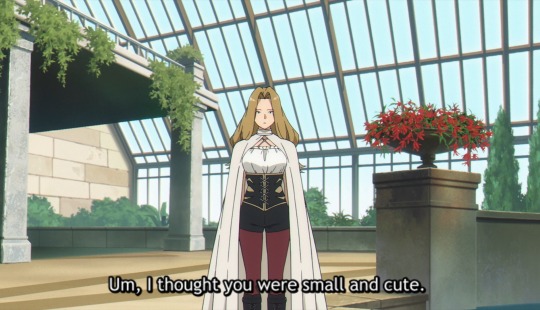
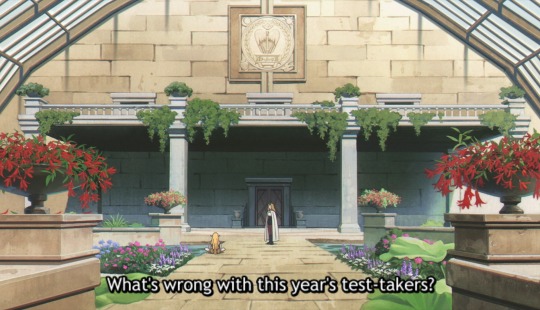
I love seeing Frieren just talk to people.
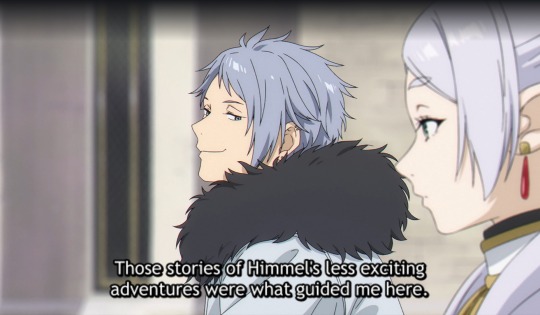
The interaction between them is great because Wirbel knows she's listening despite also reading.
Also love that he also admired Himmel.


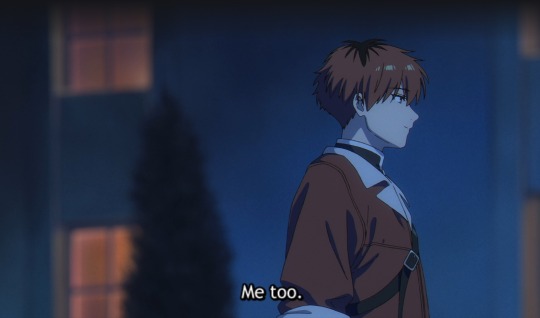
Just love when Frieren is talking about how proud she is of Fern becoming a first class mage and Stark just being like me too. It's so cute.
Also Stark being able to make friends every where he goes just like Himmel hurts.

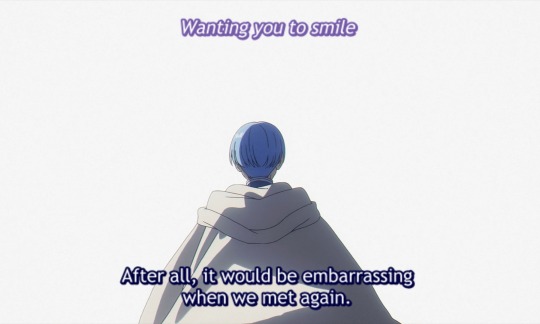
Like as Himmel is saying this I'm crying. Like guess I'm gonna be embarrassed when I see you again.
Love this anime!!!!
#sousou no frieren#frieren: beyond journey's end#frieren anime#beyond journey's end#frieren#anime#anime review#anime recommendation#crunchyroll#stark frieren#fern the human#fern frieren#himmel#himmel the hero
102 notes
·
View notes
Text
Fall 2023 Anime Review
The 24 episodes series this season are popping off. Honestly one of the better seasons for anime that we've had in a few years.

Frieren: Beyond Journey's End (1/2) - 16/28 Episodes This show almost feels like a fever dream. There's a fuzziness to the animation style that also gives it a ghibli vibe. Definitely one of the more memorable and important fantasy series out there. It has something about it that gives it more of a deeper meaning than other series and definitely feels like each episode is it's own piece of a puzzle. 10/10 - Masterpiece
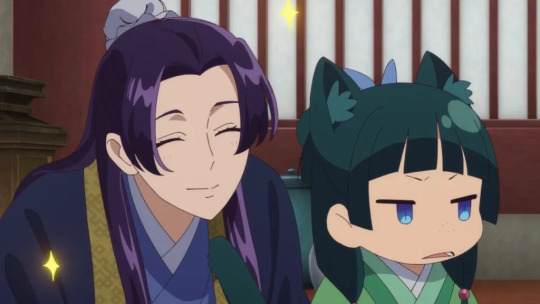
The Apothecary Diaries (1/2) - 12/24 Episodes I wasn't sure what to expect from this series but I thoroughly enjoy it so far. I ended up going ahead and reading the manga because I wanted more content. Just a fun medical mystery type show with some goofy scenes and bits of almost romance? Looking forward to more episodes in the future. 8.5/10 - Very Good +
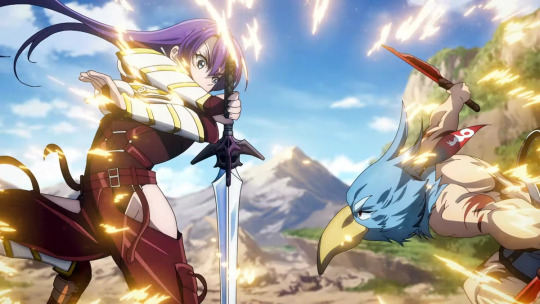
Shangri La Frontier (1/2) - 12/25 Episodes I genuinely enjoy this series. It does have a bit of an SAO vibe initially but it moves past that real quick. I think it's one of the more enjoyable series for people who actually enjoy and appreciate video games. Overall, the game itself just looks like a lot of fun and you can tell the mc is enjoying it too. 8/10 - Very Good
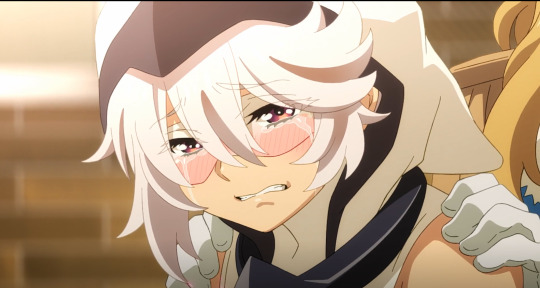
Shy - 12 Episodes I don't know why people aren't into this series. I think it would definitely have done better had it come out during the peak of hero shows but it still hits. I think it's a really well done story and the animations are also satisfying. Reminds me a little of Justice League or Young Justice. Honestly a fun watch. 8/10 - Very Good
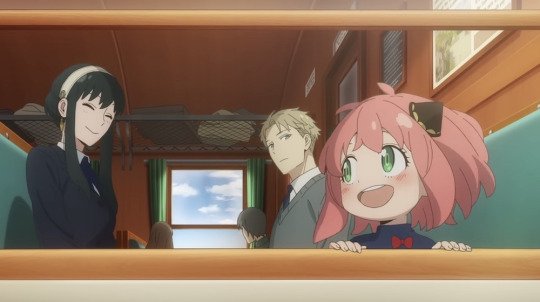
SpyxFamily - Season 2 - 12 Episodes This show never disappoints. Each episodes is just as entertaining as the first season and I don't feel like a single episode has been wasted so far. I'm still very much looking forward to future content. 8.5/10 - Very Good+ Dr. Stone - Season 3 - 11 Episodes For some reason I always seem to put off watching this series but as soon as I get into it, it's so worth it. Definitely still holding up to the pilot season and I'm just as stoked for future seasons. Solid consistency. 8/10 - Very Good The Eminence In Shadow - Season 2 - 12 Episodes This had such a banger first season. Definitely just a fun show for me that I try not to look into too much when watching. Has straight forward fun protagonist and the story hasn't flopped so far. 7.5/10 - Good+ Ron Kamonohashi's Forbidden Deductions - 13 Episodes The first few episodes come off as a cheesy Sherlock spoof but it definitely takes off on the later cases. It becomes less overall about the cases but the combo of the two and the different situations they end up in. By the end of the season I felt like the cases they worked were fun and interesting and I liked the character building. 7/10 - Good My Daughter Left the Nest and Returned an S-rank Adventurer I gave this 3 episodes. Honestly I think ending it at episode 3 was fine.. The story feels weak but it's a nice short story if you watch the first 3 episodes and don't care the whole demon lord plot. 5/10 - Average The Rising of Shield Hero - Season 3 - 12 Episodes I got through about 4 episodes and really enjoyed it and then it just went downhill. It turned into some kind of monster raising anime with a side of shield hero. I initially dropped it but decided to come back and finish it because i'm still attached to the overaching story for some reason. I found the last 3 episodes were decent and did add to the overall story but I still had such a rough time in the first 3/4. 4.5/10 - Less than Average Goblin Slayer - Season 2 - 12 Episodes I was so disappointed by this show. I honestly can't remember how the first season ended but I don't feel like it needed this season. Felt much more like the standard harem isekai with very little interesting aspects to the story. Not to mention the whole elf incest story line they threw in there. Definitely won't be coming back for a 3rd season. Had a really hard time getting through this one. 3.5/10 - Bad/Very Bad
#anime reccomendations#anime#new anime#anime review#anime rating#2023 anime#2023 fall anime#sousou no frieren#frieren: beyond journey's end#frieren#the apothecary diaries#kusuriya no hitorigoto#shanfro#shangri la frontier#my daughter left the nest and returned an s rank adventurer#shy#shy anime#the rising of the shield hero#the rising of the shield hero season 3#spy x family#spy x family anime#spy x family season 2#dr.stone#the eminence in shadow#the eminence in shadow season 2#goblin slayer season 2#goblin slayer#ron kamonohashi#ron kamonohashi's forbidden deductions
22 notes
·
View notes
Text
it’s all fun and games until you have to take a step back from themes and motifs to look at the basic story structure you’re working with
#anna's fic notes#small jobs is my favorite thing to work on. it is hands down my favorite fanwork i've ever done. but sometimes i have to close the docs#and take a step back to decide: what is the goal of this story? what do i want the reader to feel? where are these events going?#is this a three act story? do i need to review the hero's journey? how does this fit together - almost mechanically.#what are the puzzle pieces i need to make this fit together in a satisfying way? and i really only do this with this series bc it is my fav#every other fic i'm sorry but you are not small jobs. this is why it takes a year every time i want to update the story.#i KNOW the themes of the 'verse. i KNOW the tone i want to hit. i KNOW the little tics that need to show up/when they need to stay away#but i have to make a checklist to figure out what the plot is every time. introduction. rising action. red herring? climax/epilogue. etc#small jobs isn't just about vibes (except for that one interlude) it HAS a story to it it's just that i am. not great at those lol
3 notes
·
View notes
Text
#hero#hero journey#fantasy manga#mangalore#free manga#manga review#anime and manga#manga and stuff#eeotb#manga#indie comic#comic#fmab#webcomic#loz
2 notes
·
View notes
Text
Peer Review Time! Let's rate episodes my friend gave 5 Stars when they watched for the first time
#technically the heroes journey was also 5 stars#but there wasn't room in the poll and it dealt me so much psychic damage it got cut#spn#ultimate spn marathon#poll#polls#episode review#supernatural polls#spn polls#supernatural season 13#supernatural season 14#supernatural season 15#scoobynatural#lost and found#the scorpion and the frog#various and sundry villains#mint condition#optimism#nihilism#peace of mind#last call#the trap
2 notes
·
View notes
Text
Absolutely No Adventures is a fantasy comedy that follows a baker who will do anything to avoid getting roped into quests and adventures. This is my review.

@noadventurespod flows a baker name Sig. He lives in a stereotypical fantasy world, and has a fairly impressive pedigree. He’s a seventh son of a seventh son, he’s a minor noble in several kingdoms and principalities, and features into several prophecies. Naturally, he’s quite the hot commodity. Almost everyone has tried to rope him into various quests and adventures. However, as the name of the show says, Sig wants no adventures. He just wants to bake, and will do whatever it takes to avoid going on a quest. The show follows the (un)adventures of Sig and his friends at his bakery, Sig’s Signature Eats. They’re serving up cookies, cakes, pies, bread, and absolutely no adventures.
I’d been wanting to review this one for a while. I’d been waiting til Absolutely No Adventures put out it’s latest episode; a full one hour special, in contrast to the usual runtime of twelve to fifteen minutes. Series creator Destiny Howell wanted to know what people thought of the latest episode. So, I decided to do one better and formally review the entire show.
Absolutely No Adventures takes a more comedic approach to the fantasy genre. It is lighthearted and humorous, and doesn’t take itself too seriously. It is cut from the same cloth as audio dramas like Alba Salix, Royal Physician and The Two Princes. I really love the bouncy Medieval-style music that accompanies the opening of each episode. Absolutely No Adventures also frequently parodies and pokes fun at other works of fantasy such as The Chronicles of Narnia, The Wizard of Oz, and Harry Potter. But it does so, mostly, in a good-natured and affectionate way.
Sig can be seen as a deconstruction of a typical fantasy protagonist. More specifically, he’s a deconstruction of the reluctant hero archetype. There have been many chosen one, throughout fantasy, who resent their role and wish they hadn’t been chosen. Harry Potter, Percy Jackson, Avatar Aang, and Bobby Pendragon are just a few examples of reluctant chosen ones. However, most reluctant chosen ones wind up resigning themselves to their fate. By contrast, Sig takes proactive measures to escape the many prophecies and quests he figures into. Naturally, Sig has become very quick-witted, and is good at weaseling his way out of tough situations.
Now, I am perfectly happy with the typical twelve to fifteen minute episode, but I am pleased to see Absolutely No Adventures trying new things. The hour-long special was a lot of work, but it was clearly a labor of love. I also really liked the episode title card. It looked like a title card from a hypothetical animated adaption of Absolutely No Adventures. Everyone involved with the episode clearly gave their all to whatever part they played in the production. I don’t know where Absolutely No Adventures is planning on heading in the future, but it clearly has a bright future ahead of it. I can’t wait to see what else this show has in store for us.
Have you listened to Absolutely No Adventures? If so, what did you think?
Link to the full review on my blog: https://drakoniandgriffalco.blogspot.com/2022/03/the-audio-file-absolutely-no-adventures.html?m=1
#audio drama#audio fiction#review#fantasy#fantasy fiction#Absolutely No Adventures#audio drama podcast#audio drama review#podcast recommendations#fiction podcast#podcast#podcast reviews#podcasts#comedy#parody#hero’s journey#baker#baking#satire#Audio drama recs#podcast recs#Fantasy#Fantasy Fiction#Second World#Secondary World#Second World Fantasy#Destiny Howell#audio drama recommendations#podcast recommendation
2 notes
·
View notes
Text
youtube
The Dark Secret of Heracles: What Drove the Hero to the 12 Labors
A crime, a hero, and a tragedy: what truly compelled Heracles to undertake his immortal deeds?
Heracles is remembered as the greatest hero of Greek mythology, a symbol of strength and courage. Yet behind his legendary achievements lies a story few know—a journey of suffering, vengeance, and redemption. This video unveils the origins of his 12 Labors, delving into hidden secrets and the impossible challenges he faced to purify his soul. Discover how fate, the jealousy of the gods, and human rivalries intertwine in an epic tale that defined the humanity of an immortal hero. Get ready for a journey into the myths like never before!
#12 Labors#Eurystheus#Greek deities#Greek legends#Greek mythology#Greek tragedies#Hera and Heracles#Heracles#Hercules#Zeus and Heracles#ancient heroes#ancient stories#fate and redemption#legend of hercule tas#legendary feats#myth of Heracles#mythic heroes#redemption rooted in mythology.#secret life of bees hero's journey#secret of bone hill review#secret of the hero botw#youtube#atrumvox#mythology#videos#fantasy#Youtube
1 note
·
View note
Text
I feel so overwhelmed and like I have so much stuff to do. so close to being done with the cs class I had to take an incomplete in spring 2023. need a rough draft of a paper I have zero ideas for on Wednesday. in the process of making a gifset for the great comet production I saw last week!
#sooo much coding and my professor is very picky and takes points off for the tiniest things (like leaving small amounts of code commented)#i have to compare something in my life to the hero's journey stuff we read about for my paper but i have zero ideas#i was gonna be dramatic and talk about the depression because there's lots of successes and failures#but we're doing peer review and idk if i feel comfortable sharing that with everyone#i dont want to do peer review. i have a very different academic background than my community college classmates#im not saying that im better than community college students. it's just that I've done 3 years at a top university#so i have a lot more academic experience probably than first or second year community college students#im feeling really stressed as the reinstatement period for returning from a medical leave of absence comes closer
1 note
·
View note
Text

Waterboarding couldn't get this out of me
#the rehearsal is a very good book imo. its a bit of an experiment for people who are not used to reading plays because its chapter = scene#i wonder if people struggle because there is limited expo so a lot of envisioning has to happen in your head...#there is no 'character development' the way the reviewer wishes - its literally people acting according#to their personalities and beliefs. we are at the beginning and in the story. there is no hero journey 😭
0 notes
Text
Book Review: ‘Kingdom of the Blazing Phoenix’

Kingdom of the Blazing Phoenix by Julie C. Dao My rating: 3 of 5 stars From monastery to palace. From forest to desert to mountain. The path taken in this fantastical rendering of the hero's journey pulls readers into and through all sorts of places and lands and realms whose beauty and danger intersect and overlap. KINGDOM OF THE BLAZING PHOENIX is a fun and engaging sequel, but the novel's scope treads a wholly different narrative curiosity than its forebear. Princess Jade, raised as a monk, is summoned to the palace by the widely revered (and widely feared) Empress Xifeng, sly sovereign and dark sorceress of Feng Lu. Jade is in her middle teens, enjoys peaceful folktales, and delights in life's simplicities. She is not made for palace intrigue. She is not made for rancorous statecraft. She is not made for puzzles wrought by restless guardians of sacred relics. Or is she? Xifeng is a poison, slowly killing Feng Lu and its people. If anyone has a claim to the throne, to stop her, it's the pious young princess who closely resembles the woman Xifeng replaced to assume her power. But if Jade is to challenge Xifeng for the throne, if she is to save her people, she's going to need some help. A lot of help. KINGDOM OF THE BLAZING PHOENIX is a heavily layered and deeply threaded hero's journey: Jade rises from an unlikely station, discovers her call to action, yields to myriad setbacks, and finds her courage in successive moments of danger and difficulty. For readers who desire a tome of Asian fantasy within this rubric, this novel is downright absorbing, but the novel may also feel all too conventional, for readers seeking something more. This book's predecessor (Forest of a Thousand Lanterns) deliberately inverted this custom by sympathizing with the villain and provoking good characters into making bad decisions (and encouraging them live with the consequences). The current novel seemed content to balance the scales. And to that end, it's a good book. Jade is a strong girl; she's not always strong and she's not always brave, but she learns to be strong and learns to be brave according to the demands of her journey and the needs of her friends. Highlights of the novel are explicitly twofold: the author's compressed but effective worldbuilding, and the supporting cast. Of the first, the author composes a handful of highly immersive if briefly visited landscapes. Mountains inhabited by rumored bands of assassins; bramble death-mazes in the middle of nowhere; underground caverns haunted by a cast-out desert god; solemn temples made echoic by the humble chanting of bald monks. The novel jaunts through these places in accordance with Jade's quest to acquire or retrieve certain relics, but however short the visit, the experience is worthwhile. Of the second, the author resoundingly fulfills a familiar decree of the genre's expectations. Strong secondary characters are essential to the hero's journey, and in KINGDOM OF THE BLAZING PHOENIX, Jade makes specific mention of this essentialness. Wren, a scullion who dreams of adventure, is the muscle. She's also the granddaughter of Jade's nursemaid and also holds some jealousy toward the princess. Wren is not classy, but she is always honest ("We may be servants, but we still deserve dignity," page 65). Other meaningful supporting characters include Amah, said nursemaid, as well as a handful of ghosts and ambassadors. Magic and sorcery duel for attention in this story, but contrary to the previous novel, good magic abounds. The image of Empress Lihua bestows grace and wisdom: ("Those hungry for power are as flawed as they like to appear strong," page 277), whereas the apparition of Fu, a man killed under speculative circumstances, yields caution ("Emperors play fast and loose with all of their children. Son or daughter, prince or princess. We are pawns in their game. That is the way of a ruler," page 284). KINGDOM OF THE BLAZING PHOENIX occasionally risks stewarding readers with too much convenience, as the tangle of opportunity driving Jade's story rolls from adventure to adventure. For example, after fleeing the Serpent God, a dark river just so happens to speed her westward, toward the Kingdom of Dagovad, her next destination. Quite convenient. But such is the nature of this type of novel. The book successfully invests in a protagonist who learns from her mistakes and likewise knows when to set aside humility and step into a challenge. Jade's experience in fantastical heroics is more than an effort to save her struggling kingdom, it's an education in the diversity of resourcefulness and integrity required to be a good person.
Book Reviews || ahb writes on Good Reads
Browse insta for more comics and book reviews.
#ya fiction#asian fantasy#kingdom of the blazing phoenix#julie c dao#authors of color#philomel books#review#princess jade#empress xifeng#empress lihua#folktale#mythology#adventure#court drama#beauty and danger intersect and overlap#feng lu#live with the consequences#desert god#strong secondary characters are essential#heros journey#too much convenience#3 of 5 stars#goodreads
0 notes
Text
I've walked past the Barbie branded selfie booth, sat through the reel of old commercials that precede the previews, and watched Margot Robbie learn to cry, and I’m still not sure what “doing the thing and subverting the thing,” which Greta Gerwig claimed as the achievement of Barbie in a recent New York Times Magazine profile, could possibly mean. This was the second Gerwig profile the magazine has run. I wrote the first one, in 2017, which in hindsight appears like a warning shot in a publicity campaign that has cemented Gerwig’s reputation as so charming and pure of heart that any choice (we used to call them compromises) she makes is justified, a priori, by her innocence. This is a strange position for an adult to occupy, especially when the two-hour piece of branded content she is currently promoting hinges on a character who discovers that her own innocence is the false product of a fallen world. But—spoiler alert!—the point of Barbie’s “hero’s journey” is less to reconcile Barbie to death than to reconcile the viewer to culture in the age of IP.
“Doing the thing and subverting the thing”: I haven’t finished working out the details, but I think the rough translation would be Getting rich and not feeling feel bad about it. (Or, for the viewer: Having a good time and not feeling bad about it.) One must labor under a rather reduced sense of the word “subvert” to be impressed with poking loving fun at product misfires such as Midge (the pregnant Barbie), Tanner (the dog who poops), and the Ken with the earring, especially given that the value of all these collectors’ items has, presumably, not decreased since the film opened. Barbie may feature a sassy tween sternly informing Robbie’s Stereotypical Barbie that the tiny-waisted top-heavy billion-dollar business she represents has made girls “feel bad” about themselves, but if anyone uttered the word “anorexia,” I missed it. (There was a reason Todd Haynes told the story of Karen Carpenter’s life and death with Barbies, and it wasn’t because an uncanny piece of molded plastic has the magical power to resolve the contradictions of girlhood and global capitalism.) There’s a bit about Robbie going back into a box in the Mattel boardroom, but Barbies aren’t made in an executive suite; they come from factories in China. On the one hand, it’s weird for a film about a real-world commodity to unfold wholly in the realm of ideas and feelings, but then again, that’s pretty much the definition of branding. Mattel doesn’t care if we buy Barbie dolls—they’re happy to put the word “Barbie” on sunglasses and T-shirts, or license clips from the movie for an ad for Google. OK, here’s my review: When Gerwig first visited Mattel HQ in October 2019, the company’s stock was trading at less than twelve dollars a share. Today the price is $21.40.
Christine Smallwood, Who Was Barbie?
9K notes
·
View notes
Text
Tips for building immersive plots
1. Start with your core idea
• Every plot begins with a spark—a question, a concept, or a character. Build from that seed.
• How? Ask, "What excites me about this story?" and focus your energy there.
• Example: A story about a magical curse could explore themes of redemption or betrayal.
2. Brainstorm freely
• Don’t start by thinking about structure. Instead, write down every idea you have—plot points, character traits, world details—without judgment.
• How? Use mind maps, lists, or “what if” questions to expand your ideas.
• Example: “What if two rival kingdoms were forced to unite to stop a shared enemy?”
3. Map out key events
• Divide your plot into beginning, middle, and end, and identify major turning points. These events should shape the character’s journey.
• How? Use the three-act structure, or simply think in terms of setup, confrontation, and resolution.
• Example:
Beginning: A thief steals a sacred artifact.
Middle: The artifact begins to curse them, forcing them to seek help.
End: They must choose between keeping the artifact’s power or destroying it.
4. Plan with cause and effect
• Immersive plots follow logical progression. Ask yourself: “What happens because of this event?” for every key moment.
• How? Make sure each event impacts the characters or world.
• Example: A hero saves a village → the village leader reveals a secret about the hero’s past → this drives the hero to confront their estranged parent.
5. Flesh out your subplots
• Subplots add depth and make your world feel real. Tie them to the main plot for maximum impact.
• How? Use subplots to explore secondary characters, add emotional stakes, or introduce twists.
• Example: While on a mission to defeat a villain, the hero struggles to repair their broken friendship with their ally.
6. use story beats to stay organized
• Break your story into smaller moments: inciting incident, midpoint twist, climax, resolution.
• How? Write one sentence for each beat to outline the flow of your story.
• Example:
Inciting incident: A cursed item bonds to the protagonist.
Midpoint: They discover the curse is tied to a powerful enemy.
Climax: They must sacrifice their freedom to destroy the curse.
7. Think of immersive twists
• Twists keep readers engaged and make your story unforgettable. They should feel earned, not random.
• How? Ask, "What would surprise the reader but make sense in hindsight?"
• Example: The mentor helping the hero turns out to have caused the conflict in the first place.
8. Build emotional stakes
• Plot isn’t just about events—it’s about how those events affect your characters. The stakes should feel deeply personal.
• How? Tie the plot to your protagonist’s fears, desires, and growth.
• Example: A hero who’s afraid of failure is forced to lead a mission where the cost of failure is catastrophic.
9. Create a planning routine
• Writing immersive plots takes time and refinement. Set aside regular sessions to brainstorm, refine, and test your ideas.
• How? Use tools like storyboarding, sticky notes, or apps like Scrivener to organize your ideas.
• Example: Start each session by reviewing your previous notes, then tackle one section of your plot.
10. Test your plot
• Once you’ve mapped out your story, summarize it to see if it holds together. Does each event flow logically? Are the stakes clear?
• How? Share your outline with a friend or writer’s group for feedback.
• Example: “A reluctant hero must destroy a magical artifact to save their world, but doing so will cost them their memories.”
Follow for more!
#writeblr#writer stuff#writers on tumblr#writerscommunity#writing#novel writing#tips#writing tips#creative writing#writers and poets
717 notes
·
View notes
Text
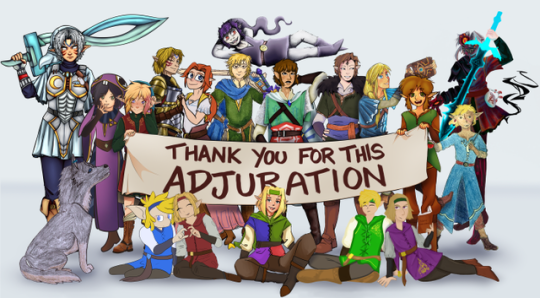
“Many places I have been
Many sorrows I have seen
But I don't regret
Nor will I forget
All who took that road with me”
-The Last Goodbye by Billy Boyd
This is an Adjuration by @not-freyja, after 86 chapters, 300k words, and 10 months of joy, laughter, tears, heartbreak and love, has finally reached its end.
Adjuration is a tragedy that is nothing short of an act of love. That much is clear in the passion and dedication put towards the story, the characters, and the message Freyja is trying to convey. This fic will teach you about love. About death. About the inevitability of existence and why despite knowing it will all come to an end, there is still meaning in trying and hoping and loving each other. In loving yourself. You will laugh, you will cry, you will hope and you will despair as you read this story, but you will not be able to put it down.
It’s hard to say goodbye to something that has been so important to and loved by so many people. So we won’t. Instead, we will say thank you for this incredible journey and the community this fic has built. For the friendships that have been made and the endless inspiration you have given us. Thank you for wanting to tell a story, and for letting us join you around the campfire to listen.
Thank you.
(If you like Linked Universe and haven’t yet read Adjuration, see below for spoiler free reviews of this fic and artist credits.)
This is an Adjuration is the kind of story you fall in love with, the kind of story you think keep thinking about long after you put it down. The kind you keep finding hidden details in after you think you’ve got it figured out.
The characters are distinct and people with their own voices, motivations, relationships and histories. You’ll have your favourites but love them all. They influence how you’ll see the characters in everything else.
It’s full of moments where everything clicks and everything before is recontextualised in a way that’s so satisfying and make the whole story very re-readable. A time travel story where all loops are already closed, where you can know but not yet understand what will happen. It’s long, complex, and beautifully, meticulously planned and detailed. It’s clever and considered, funny and heartbreaking.
A story that whispers ‘it matters’ over and over. It is worth it to love, it is worth it if it doesn’t last forever, it is worth it to give someone a little more time, it is worth it to fight. It’s about loving others and your world and finding grace for yourself.
It’s loss and tragedy and the cruelness of fate. It is the sacrifice and the breaking.
Full of heart to both fill yours and break it in the best possible way.
It’s about love. Always.
By @toyouhellohowareyou
Sometimes, it’s hard to explain to others why art moves us.
I could tell you This is an Adjuration will make you cry, laugh, and sit at the edge of your seat in anticipation. And it’s probably true - I did all of that as I read, often with a coffee in one hand, early in the morning as I got ready for the day.
But that’s not the reason why I’m writing this.
The real reason is how it followed me during the rest of the day.
You see, at a certain point I realized this isn’t a story about Links going on adventures. Well, it does feature Links, and they do go on adventures, so let’s talk about that for a minute.
The first thing that caught my attention about this book was the characters. Each individual is unique, interesting, and exciting to follow. Not only are the Links individually compelling, but one thing that stands out in Adjuration is how the relationship between each Hero and their own worlds matter, and these connections shift, evolve, break and grow as the plot progresses.
Freyja does an incredible job of bringing together impactful storytelling with humor and heart. This is an Adjuration starts with an interesting premise, and then twists and turns in directions you wouldn’t expect. It’s rich in thought-provoking moments, soft joy and intense action, blended in with carefully crafted time travel and magic.
Adjuration sucked me into the world it builds, combining believable characters with fascinating stories, an unnervingly devious antagonist, plot twists, and lovingly crafted details that slip unnoticed until you’re surrounded on all sides. It made me cheer for characters I feel as if I’ve known intimately for years, made me worry for their safety as I would for that of a loved one, kept me hunting for hints and hidden references, pulling on a thread to try to find the end only for it to twist and loop into itself and show me a completely new side to the story.
Yes, This is an Adjuration is a fanfiction piece that explores the winding river flow of the Legend of Zelda timeline and how the stories of each Hero merge into each other. It also stands out for its heavy emotional content, and it doesn’t shy away from angst and hurt.
But to me, Adjuration is an epic journey that taught me how the choices we make, make us in turn. It’s a tragedy that deals with pain and healing, and it bares naked the non-linear nature of grief. It’s a celebration of the things that make us unique, of our flaws, an essay of the impact of little acts of love. Indeed, it’s a story about love.
I can tell you now, This is an Adjuration moved me. It still does. It has a special way to surface in my mind in unexpected ways at seemingly random times, from something as simple as tossing an apple core, to watching a lightning storm in the distance, or finding a picture of an old friend.
And every time, without fail, it makes me think about love.
By @sunny-porridge
This is an Adjuration is a wonderfully and beautifully crafted story about love, loss, and choice as the various incarnations of Link come together and travel through time. Freyja seamlessly weaves a tapestry of setup and payoff across different timelines and loops, in the best-constructed time travel plot I’ve ever seen on page or screen. Even at its surface, Adjuration is an emotional rollercoaster involving tragedy and the soft moments that make that tragedy worth it. But the deeper you look, the more meaning you can pull from every chapter of this amazing work. This work has made me cry, squeal with delight, and think more deeply about its themes all while having an absolute blast reading it. So in summary: READ IT. READ IT. READ IT NOW. YOU WILL NOT REGRET IT.
By @life-in-winter
While I love that every chapter is emotionally enthralling, with carefully woven, visceral tension you crave in any good story, yet Adjuration is more than that, and you feel it in the careful weave of each character and plot point. Nothing is lost or unanswered. It's the kind of story that, by the end, makes you stop and take a hard look at your own life. Are you appreciating the now? Are you savoring joy? Are you so wrapped up in fear that you can hardly take care of yourself? Do you know who you are?
This story is more like an external experience. It's riding atop a tsunami. How do you handle that ride, Link?
There aren't enough words to describe how amazing this fic is.
@needfantasticstories
Artist credit
Legend: @gia-d
Hyrule: @bittirsweeteer
Time: @toonblade
Sky: @noorahqar
Warriors: @whitewinterstar
Wild: @weavingstarlight
Twilight: @bluury2
Wind: @thewitchdoctor39
Four: @lunaopus
Red: @peepthatbish
Blue: @glowingmin
Green: @winterfen
Vio: @waterfallstream
Shadow: @deleetrix
Wolfie: @linkiscool333
Fierce Deity: @awildsilver
Ravio: @lele5429
Malon: @tooner-tastic
Dink: @passerinesoncaffeine
#linked universe#linked universe fanfic#linked universe fic#this is an Adjuration#this is an adjuration#lu legend#lu hyrule#lu four#lu red#lu vio#lu blue#lu green#lu sky#lu wild#lu warriors#lu time#lu twilight#lu wind#lu shadow#lu colors#lu fanart#lu dink#yiga clan
542 notes
·
View notes
Text
Disney's Wish
Look, Disney's Wish has been universally panned across the internet, and for good reason.
It’s just…kind of okay.
When we sit down to watch a Disney film—you know, from the company that dominated the animation industry from 1989 to (arguably) the mid 2010’s and defined the medium of animation for decades—we expect something magnificent. Now, I could sit here and tell you everything that I thought was wrong with Wish, but if you’re reading this review, then I imagine that you’ve already heard the most popular gripes from other users across the web. So, let me focus in:
The biggest problem with Wish—in fact, the only problem with Wish—is Magnifico.
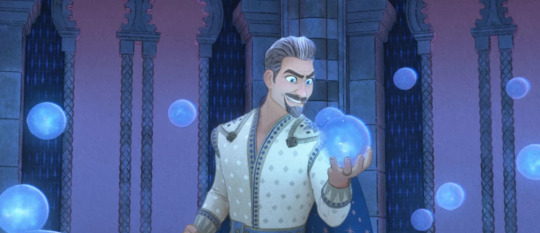
Whoa, that’s crazy! There’re so many things about Wish that could’ve been better! The original concept was stronger! The music was bad--
I hear you, I do. But stay with me here, okay? Take my hand. I studied under artists from the Disney renaissance. I teach an adapted model of Disney’s story pipeline at a University level. I spent a ridiculous amount of time getting degrees in this, and I am about to dissect this character and the narrative to a stupid degree.
First, we need to understand that a good story doesn’t start and end with what we see on the screen. Characters aren’t just fictional people; when used well, characters are tools the author uses (or in this case, the director) to convey their message to the audience. Each character’s struggle should in some way engage with the story’s message, and consequently, the story’s theme. Similarly, when we look at our protagonist and our antagonist, we should see their characters and their journeys reflected in one-another.
So, what went wrong between Asha & Magnifico in terms of narrative structure?
Act I
In Wish, we’re introduced to our hero not long into the runtime—Asha. She’s ambitious, caring, and community-oriented; in fact, Asha is truly introduced to the audience through her love of Rosas (in “Welcome to Rosas”). She’s surrounded by a colorful cast of friends who act as servants in the palace, furthering her connection with the idea of community but also telling us that she’s not of status, and then she makes her way to meet Magnifico for her chance to become his next apprentice.
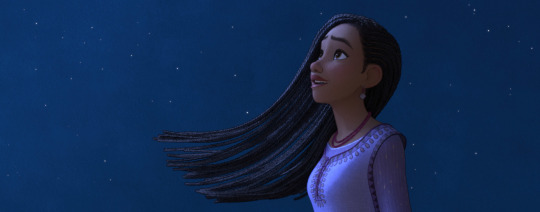
Quick aside: I'm not going to harp on Asha as a character in the context of Disney's overall canon. Almost every review I've seen covers her as a new addition to Disney's ever-growing repertoire of "Cute Quirky Heroines", and I think to be fair to Asha as an actor in the narrative, it serves her best to be weighed within the context of the story she's part of.
As Asha heads upstairs for her interview, we're introduced to the man of the hour: Magnifico. He lives in a tower high above the population of Rosas, immediately showing us how he differs from Asha; he’s disconnected from his community. He lives above them. He has status. While the broader context of the narrative wants us to believe that this also represents a sense of superiority, I would argue that isn’t what Magnifico’s introduction conveys; he's isolated.
Despite this distance, he does connect with Asha in “At All Costs”. For a moment, their goals and values align. In fact, they align so well that Magnifico sees Asha as someone who cares as much about Rosas as he does, and almost offers her the position.
… Until she asks him to grant Saba’s wish.
This is framed by the narrative as a misstep. The resonance between their ideals snaps immediately, and Magnifico says something along the line of “Wow. Most people wait at least a year before asking for something.”
This disappointment isn't played as coming from a place of power or superiority. He was excited by the idea of working with someone who had the same values as he did, who viewed Rosas in the same way he does, and then learns that Asha’s motivations at least partially stem from a place of personal gain.
Well, wait, is that really Asha's goal?
While it's not wholistically her goal, it's very explicitly stated & implied that getting Saba's wish granted is at least a part of it. The audience learns (through Asha's conversation with her friends before the interview) that every apprentice Magnifico has ever had gets not only their wish granted, but the wishes of their family, too! Asha doesn’t deny that this is a perk that she’s interested in, and I don't think this is a bad thing.
So, Is Asha’s commitment to Saba selfless, or selfish? I’m sure the director wanted it to seem selfless, wherein she believes her family member has waited long enough and deserves his wish granted, but we can’t ignore the broader context of Asha essentially trying to… skip the line.

Then, we get our first point of tension. Magnifico reveals his “true colors” in snapping at Asha, telling her that he “decides what people deserve”. This is supposed to be the great motivator, it’s meant to incite anger in the audience—after all, no one gets to decide what you deserve, right? But unfortunately for the integrity of the film and the audience's suspension of disbelief, at least part of Magnifico’s argument is a little too sound to ignore:
Some wishes are too vague and dangerous to grant. Now, there’s visual irony here; he says this after looking at a 100 old man playing the lute. The idea that something so innocuous could be dangerous is absurd, and the audience is meant to agree.
... But we’ve also seen plenty of other wishes that might be chaotic—flying on a rocket to space, anyone? The use of the word vague is important, too—this implies wording matters, and that a wish can be misinterpreted or evolve into something that is dangerous even if the original intent was innocuous. His reasoning for people forgetting their wish (protecting them from the sadness of being unable to attain their dreams) is much weaker, but still justifiable (in the way an antagonist’s flawed views can be justified). The film even introduces a facet of Magnifico’s backstory that implies he has personal experience with the grief of losing a dream (in the destruction of his home), but that thread is never touched on again.
What is the audience supposed to take from this encounter? If we’re looking at the director’s intent, I’d argue that we’ve been introduced to a well-meaning young girl and a king who’s locked away everyone’s greatest aspiration because he believes he deserves to have the power to decide who gets to be happy.
But what are we shown? Our heroine, backed by her friends, strives to be Magnifico’s apprentice because she loves the city but also would really like to see her family's wishes granted. When this request is denied and she loses the opportunity to be his apprentice, she deems Magnifico’s judgement unfair & thus begins her journey to free the dreams of Rosas’ people.
In fairness, Magnifico doesn’t exhibit sound judgement or kindness through this act of the film. He’s shown to be fickle, and once his composure cracks, he can be vindictive and sharp. He's not a good guy, but I'd argue he's not outright evil. He's just got the makings of a good villain, and those spikes of volatility do give us a foundation to work off of as he spirals, but as we’ll discuss in a bit, the foreshadowing established here isn’t used to the ends it implies.
While I was watching this film, I was sure Magnifico was going to be a redeemable villain. He can’t connect with people because he's sure they value what he provides more than they value him (as seen in “At All Costs” and the aftermath), and Asha’s asking for more was going to be framed as a mistake. His flaw was keeping his people too safe and never giving them the chance to sink or swim, and he's too far removed from his citizens to see that he is appreciated. Asha does identify this, and the culmination of her journey is giving people the right to choose their path, but the way Magnifico becomes the “true” villain and his motivations for doing so are strangely divorced from what we’re shown in Act I.
Act II:
His song, “This is the Thanks I Get!?” furthers the idea that Magnifico’s ire—and tipping point—is the fact that he thinks the people he’s built a kingdom for still want more. Over the course of this 3:14 song, we suddenly learn that Magnifico sends other people to help his community and doesn’t personally get involved (we never see this outside of this song), and that he’s incredibly vain/narcissistic (he's definitely a narcissist). I think feeling under-appreciated is actually a very strong motivation for Magnifico as a character-turning-villain, and it works very well. It’s justified based on what we’ve seen on screen so far: he feels under-appreciated (even though he’s decidedly not—the town adores him), he snaps and acts irrationally under stress (as seen with his outburst with Asha), and he’s frustrated that people seem to want more from him (again, as seen with his conversation with Asha in Act I).
But then… he opens the book.
Ah, the book. As an object on screen, we know that it's filled with ancient and evil magic, well-known to be cursed by every relevant character in the film, and kept well-secured under lock and key. But what does it stand for in the context of the narrative's structure? A quick path to power? We're never told that it has any redeeming qualities; Magnifico himself doesn't seem to know what he's looking for when he opens it. It feels... convenient.
I think it's also worth noting that he only turns to the book when he's alone; once again, the idea of connection and community rears it's ugly head! Earlier in the film, Amaya-- his wife-- is present and turns him away from taking that path. In her absence, he makes the wrong choice.
This decision could make sense; it contains powerful magic, and if it were framed in such a way that the people of Rosas were losing faith in Magnifico’s magic, as if what he can do might not be enough anymore after what they felt from Star, going for the book that we know contains spells that go above and beyond what he can already do would be logical. Along the lines of, “If they’re not happy with what I do for them, fine. I, ever the “martyr”, will do the unthinkable for you, because you want more.”

It would keeps with the idea that Magnifico believes he's still trying to help people, but his motivation has taken his self-imposed pity party and turned it into resentment and spite.
But, that’s not the case. Instead he talks about reversing that “light”, which has had no real negative or tangible consequences on Rosas. Everyone had a warm feeling for a few seconds. Again, it’s meant to paint him as a vain control freak, but… he hasn’t lost any power. The citizens of Rosas even assume the great showing of magic was Magnifico.
Act III
Then, we get to the consequences of opening the book (and perhaps my biggest qualm with this film). The book is established as being cursed. Magnifico knows it, Asha knows it, and Amaya—who is introduced as loyal-- knows it. The characters understand his behavior is a direct result of the book, and search for a way to save him. This is only the focus of the film for a few seconds, but if you think about it, the fact that his own wife cannot find a way to free him of the curse he’s been put under is unbelievably tragic. Worse still, upon discovering there is no way to reverse the curse, Magnifico—the king who built the city & “protected it” in his own flawed way for what seems to be centuries—is thrown out by his wife. You know, the wife who's stood loyal at his side for years?
It’s played for laughs, but there’s something unsettling about a character who’s clearly and explicitly under the influence of a malevolent entity being left… unsaved. If you follow the idea of Magnifico being disconnected from community being a driving force behind his arc, the end of the film sees him in a worse situation he was in at the start: truly, fully alone.
They bring in so many opportunities for Magnifico to be sympathetic and act as a foil for Asha; he’s jaded, she’s not. He’s overly cautious (even paranoid), she’s a risk-taker. He turns to power/magic at his lowest point, Asha turns to her friends at her lowest point. Because this dichotomy isn’t present, and Magnifico—who should be redeemable—isn’t, the film is so much weaker than it could’ve been. The lack of a strong core dynamic between the protagonist and antagonist echoes through every facet of the film from the music to the characterization to the pacing, and I believe if Magnifico had been more consistent, the film would’ve greatly improved across the board.
I mean, come on! Imagine if at the end of the film, Asha—who, if you remember, did resonate with Magnifico’s values at the start of the film—recognizes that he's twisted his original ideals and urges him to see the value in the people he’s helped, in their ingenuity, in their gratitude, & that what he was able to do before was enough. Going further, asking what his wish is or was—likely something he’s never been asked— and showing empathy! We’d come full circle to the start of the film where Asha asks him to grant her wish.
Pushing that further, if Magnifico’s wish is to see Rosas flourish or to be a good/beloved king, he'd have the the opportunity to see the value in failing and how pursuing the dream is its own complex and valuable journey, and how not even he is perfect.
The curse and the book (which, for the purposes of this adjustment, would need to be established as representing the idea of stepping on others to further your own goals/the fast way to success), then serve as the final antagonist, that same curse taking root in the people of Rosas who’ve had their dreams destroyed, and Asha works with the community to quell it. Asha’s learned her lesson, so has Magnifico, and the true source of evil in the film—the book—is handled independently. Magnifico steps back from his role as King, Amaya still ends up as Queen, and Asha takes her place as the new wish-granter.
This route could even give us the true “Disney villain” everyone’s craving; giving the book sentience and having it lure Magnifico in during “This is the Thanks I Get!?” leaves it as its own chaotic evil entity.
All in all, Magnifico's introduction paved a road to redemption that the rest of the film aggressively refused to deliver on, instead doubling down on weaker motivations that seem to appear out of thin air. Once the audience thinks, hey, that bad guy might have a point, the protagonist has to do a little more heavy lifting to convince us they're wrong.

Look at the big-bad-greats from Disney's library. There isn't a point in the Lion King where we pause and think, "Wait a second, maybe Scar should be the guy who rules the Pridelands." Ursula from the Little Mermaid, though motivated by her banishment from King Triton's Seas, never seems to be the right gal for the throne. Maybe Maleficent doesn't get invited to the princess's birthday party, but we don't watch her curse a baby and think, Yeah, go curse that baby, that's a reasonable response to getting left out.
What do they all have in common? Their motivation is simple, their goal is clear, and they don't care who they hurt in pursuit of what they want.
Magnifico simply doesn't fall into that category. He's motivated by the idea of losing power, which is never a clear or impactful threat. His goal at the start seems to be to protect Rosas, then it turns into protecting his own power, and then-- once he's corrupted-- he wants to capture Star. The problem is, there's no objective to put this power toward. Power for power's sake is useless. Scar craves power because he feels robbed of status. Ursula believes the throne is rightfully hers. Maleficent wanted to make a statement. Magnifico... well, I'm not really sure.
1K notes
·
View notes
Text
Jentry Chau Vs Netflix
So, I watched Jentry Chau Vs. The Underworld.
If you like beautiful (and unique) animation, complex storytelling, themes of coming of age and grief, and references to my favorite band (shout out NCT127), this is a story you should definitely check out. I would recommend it highly, even though I'm going to critique later on in this review.
Complex People and Complex Love

Gugu was a very complex character whom you could both hate as someone who was clearly manipulating Jentry in an almost unforgivable way after doing the unforgivable to her family. And yet, the series opening literally had Gugu sacrificing her life for Jentry, so no matter what was revealed, you always had to handle the uncomfortable reality that Gugu really loved Jentry.
And therein the series explored complexities in love and life, an understanding that comes with growing up and brings on its own grief. The people who raise us, our heroes, turn out to have their own lives and worlds too, their own motivations, that are often not exactly altruistic. We are not at the center of their world as much as we, as children, thought we were.
Jentry's wrestling with her relationship with Gugu was complex and interesting. The handling of Gugu's character was consistently the best in the series, and I loved it even if I'm still not sure I like Gugu. That's a good character--someone you're left pondering the legacy of.
Grief
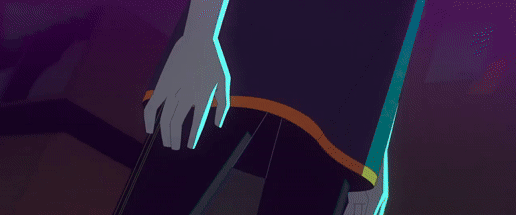
Jentry working through her grief was a major theme of the series--grief for her parents, and grief for Gugu, not just in terms of her actually dying (which does happen), but in terms of her understanding of who Gugu was and who her parents were.
Jentry's grief journey contrasts with Gugu's grief for Iris and of course Cheng's for Xiao Lan. Which is why Jentry reaching out and healing her inner child through saving Xiao Lan was ultimately a beautiful way of handling her arc. She saw a child who was scared and didn't know what was going on, and destructive in that pain, and saved her.
If you look at the series, Gugu was scared and didn't fully understand the consequences of her actions and destroyed Jentry's family as a result. Kit was scared and didn't understand how to be human and was destructive in that pain.J entry too grieves Kit and projects that fear onto the possibility of losing Michael, which leads to a rift in their relationship. And some of that fear is not understanding who they wanted to be. To quote C.S. Lewis after the death of his wife:
No one ever told me that grief felt so like fear.
Grief and fear intertwine in many ways in Jentry Chau, including through Moonie allowing herself to be possessed by the Mogui to get her husband back. This also then leads to Gugu's second death.
Gugu's farewell at the end had me full-on sobbing. In a sense, Jentry's entire arc throughout the story is a symbolic way of working through her grief for Gugu, settling with her accepting via choosing to focus on Gugu's love for her, and carrying her memory on in a literal form (the necklace). After accepting Gugu loved her, Jentry loses her fear of the underworld and her powers, and her fear of losing the people closest to her as well.
A Soul Is What You Choose
Jentry's ultimate power isn't burning, but it's being able to see people for whom they want to be. Kit and being human. Ed and being scary. Michael and joining the band.
In a world where everyone, demon or human, is trying to be what they think they need to be, trying to please others, Jentry asks them to be who they want to be, to live how they want to live.
The Best Character and the Worst Writing: Kit
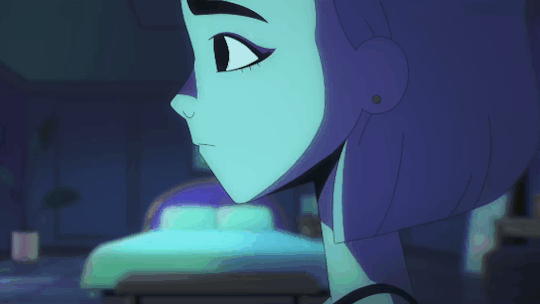
Kit is by far the most compelling character. He's continually sympathetic (while Gugu is somewhat not), conflicted, and torn between how desperately he wants to be human and the inhuman acts he believes he has to commit to be one. Plus, he doesn't understand what it means to be human, nor the complexities of human relationships.
The scene where he helps Jentry create a skinsuit is really a metaphorical sex scene--like fairly obviously. It isn't subtle.
It starts in a bedroom (and yes, animators know what they're doing when they choose setting and objects).
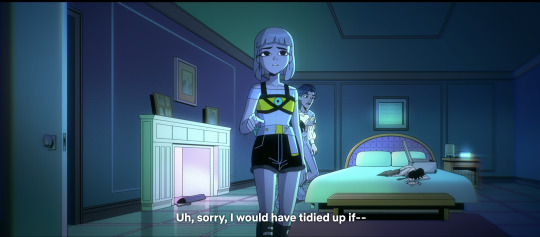
Then we have talking about looking under layers.
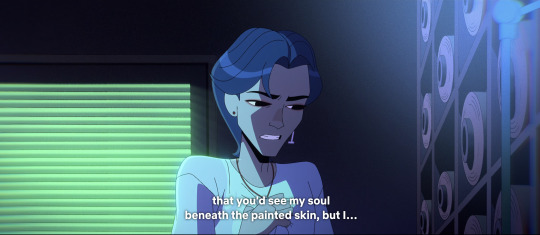
Then we have some yonic symbols and this.
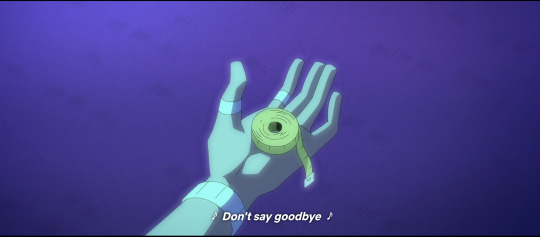
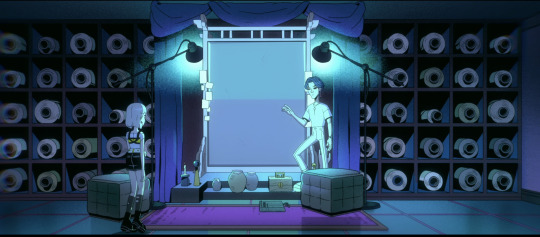
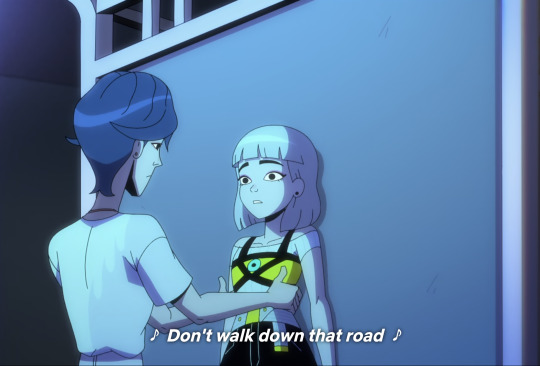
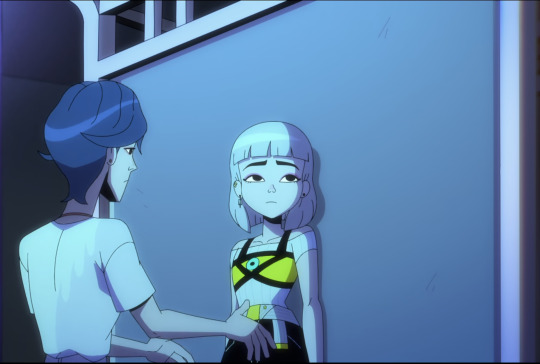
Like. And he uses a knife (a traditionally phallic symbol), and the next thing we see is cloth falling... with literal the next frame being clothes (ie, clothes coming off).
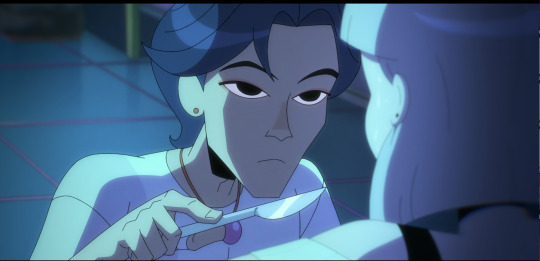
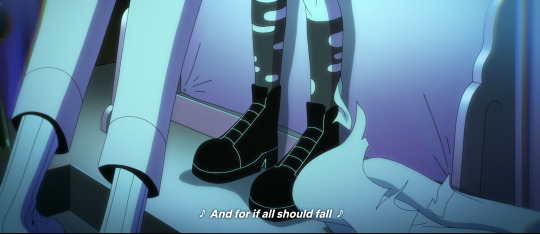
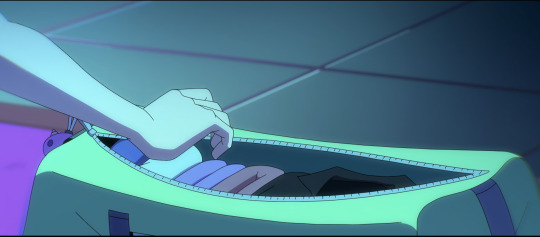
Sticking a brush (another traditional phallic symbol) in a vat of wet paint (yonic).
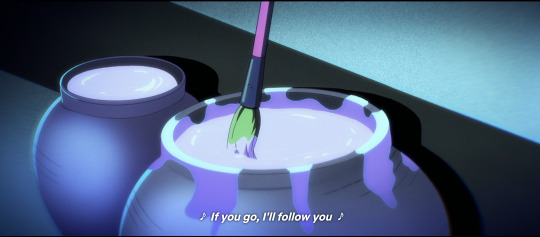
Kit: I've never done this before. It's strange. Jentry: I stand by what I said in class. You do have a soul, and you're more human than you know.
Also note the hand clasped position.
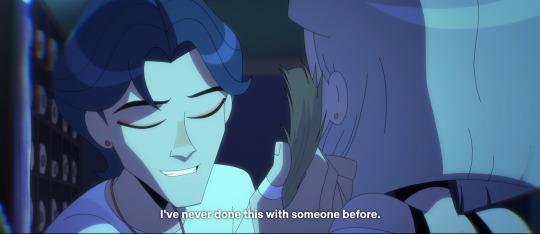
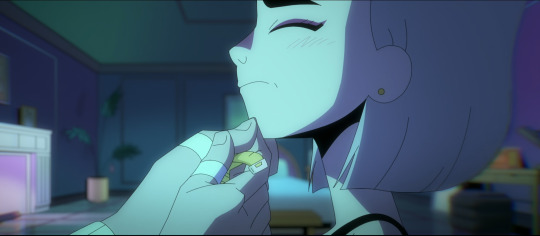
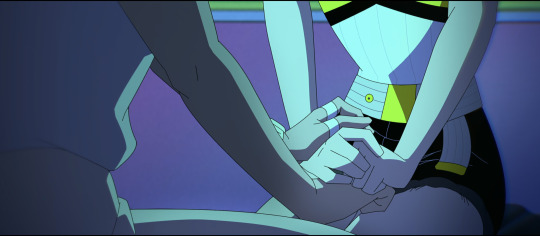
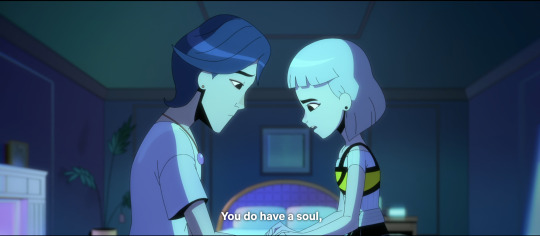
It ends with them literally "becoming one" in Kit embodying a Jentry skin to help Jentry uncover the truth--in other words, they help each other be human.
Which is why what happens next really doesn't make storytelling sense, and is actually kinda offensive.
Love Triangle: What Not To Write
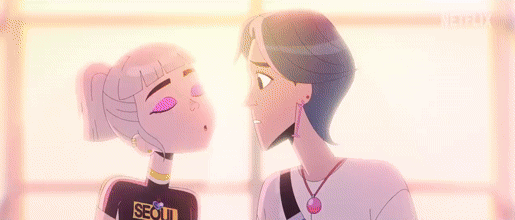
The love triangle pretty clearly was supposed to represent Jentry's links to the supernatural (via Kit) and her links to the human world (via Michael). Great potential for a love triangle, a trope I generally hate because it's almost never well done.
This was not well done. What makes it even more frustrating is that it had a ton of potential to be well done via the thematic and symbolic potential.
Having Kit suddenly go aggressive ex who can't take "no" for an answer was lazy writing, nonsensical within the characters they'd set up, and offensive. Offensive, primarily, because you absolutely should never introduce a triggering element like, oh, harassment and controlling men if you don't plan on dealing with it in the story. And they didn't. At all.
The only reason that element was there was to resolve the love triangle in a clear way--oh, Jentry should be with Michael because Kit acted threatening, even though he never had before. That's just bad writing, because if there's a clear choice in a love triangle, you gotta actually write it. Make Michael the more compelling love interest. (More on how they didn't do this later.)
The entire sequence with Kit makes no sense. Jentry tells him he's actually "hundreds of years old," parroting Tumblr-esque anti arguments about Twilight and every other paranormal love story ever. Except, the story had always explicitly framed Kit as a child being abused by Cheng and "parented" by puppets. His journey to understand who he was, that he mattered, that he could be a human too, was clearly a coming-of-age story.
You don't tend to end coming-of-age stories with death, but they did, pretty much because after the threatening scene there was no coming back.
Plus, Jentry's treatment of Kit actually was pretty bad. Now, there's never an excuse for a threatening ex, but--Kit was right about her hypocrisy in terms of how she treated demons like Ed and himself, something that Jentry isn't really asked to reckon with.
If they wanted Jentry to end up with Michael, that's fair, but her decision was taken away from her because they just decided to stamp Kit with a lazy and offensive development and then kill him off in a redemptive death that emphasizes everything that can go wrong with that trope.
Michael Deserved Better
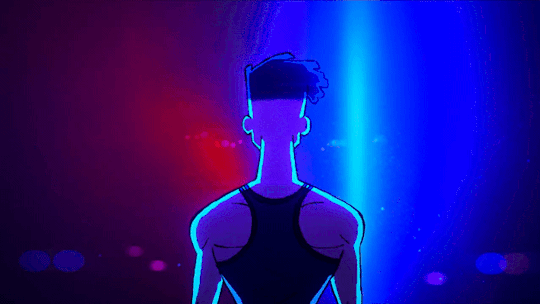
I feel like they didn't know entirely what to do with Michael. He started off with a cool arc, torn between his desire to be a band geek and his talent for football. His indecision leading to conflict with Stella and Jentry was also a great flaw, especially given that he also has visions of the future. An indecisive teenager with precognition has a ton of potential.
But, Michael's arc vanishes after the festival. Instead he's just... kinda there. Jentry chooses him because she wants to be a normal, human girl. But this isn't a good reason, because she's not (and arguably, he's not either!). Yet this isn't unpacked--the idea that everyone in this triangle is both human and supernatural, to varying degrees.
One interesting idea I spotted during the scene where Kit (as Jentry) gets asked out by Michael is that--well, it's a romantic-coded scene with two men, even if Kit turns him down for Jentry.
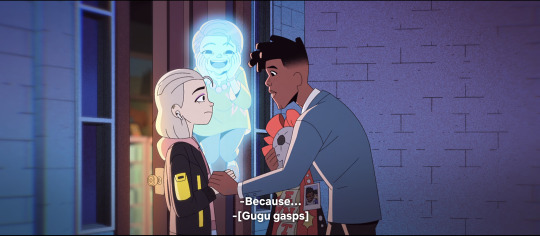
But it also coming on the heels of the metaphorical sex scene kinda seemed to almost hint at a throuple. Plus the scene after Kit's death where Jentry views them as merging, and where Michael expresses that Jentry views them the same. This would have actually been a very interesting turn for the story to take in future seasons, if they get those (especially since Stella x Tokki is apparently a thing?).
Because ultimately:
Netflix: The True Enemy

Honestly, almost all of the writing flaws I've talked about come down to the writers just not having enough time. If they had a guarantee of further seasons, they wouldn't have needed to rush to finish the love triangle. They wouldn't have needed to kill Kit. They wouldn't have needed to abort Michael's arc and conflict with Stella.
And really, Netflix continues to disappoint me in emphasizing just how much they focus on profits and money over art. They prefer fast food over an actual nutritious meal. They give shows like one season to get record ratings and if they don't, they get axed. Of course writers are going to rush to cram their story into a single season, because there's no guarantee of another season. Series aren't given any leeway to explore their interesting elements, or to find their footing. It's bad for art. However, Warner Bros exists so Netflix can't fully win the crown for worst example of capitalistic corporations killing art just yet.
I continue to be disappointed that series with no actual story that the writers want to tell (merely a concept of a plan) get renewed for seven seasons based on the writer's reputations (that they then tank with their terrible non-writing) while interesting stories with beautiful art and animation, complex ideas on grief and growing up, have to scramble to beg for another season.
#jentry chau vs the underworld#jentry chau#jentry chau kit#michael ole#jctvu#jctvu gugu#jctvu kit#jentry x kit#jentry x kit x michael#hamliet reviews#paintedflame
183 notes
·
View notes